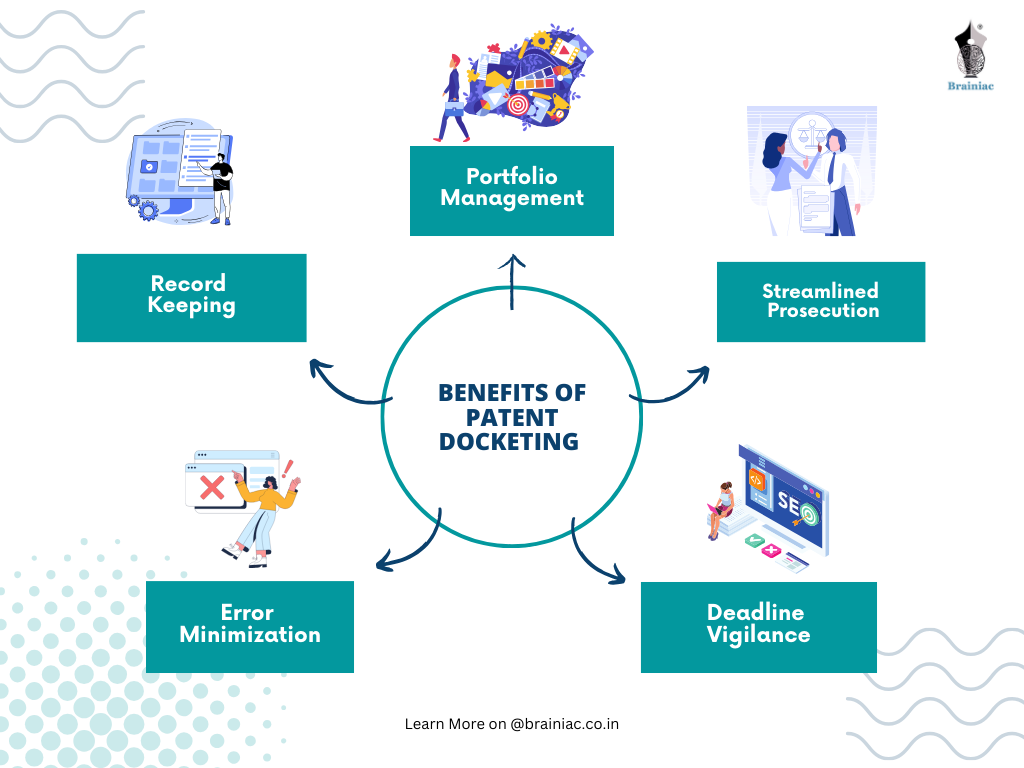Introduction
In today’s rapidly evolving global landscape, the role of intellectual property rights cannot be overstated. In India, a country recognized for its vibrant tech industry and burgeoning innovation hubs, patents stand as the cornerstone of protecting inventors’ rights and fostering technological growth. This article will delve deeper into the intricacies of patent docketing in India, shedding light on its significance, procedures, challenges, and the broader implications for innovation-driven industries.
Understanding Patent Docketing
Patent docketing is a meticulous and methodical approach employed in the management of patent applications and the associated documentation. It serves as a structured system for recording, tracking, and closely monitoring pivotal dates, deadlines, and the various actions that pertain to patent applications. At its core, the fundamental purpose of patent docketing is to establish a seamless and well-organized framework for the patent application journey, with the overarching goals of reducing errors and ensuring that applications are handled promptly and with the utmost professionalism.
Delving into the intricate workings of patent docketing, we find that this process is the backbone of effective patent portfolio management. Let’s unpack the key components and delve deeper into its significance:
1. Recordkeeping: This record includes important information like filing dates, applicant details, and the invention’s technical details. This record serves as the foundation for the entire patent process.
2. Effective Portfolio Management: It helps manage a diverse patent portfolio, allowing professionals to prioritize patents, allocate resources wisely, and ensure that the most valuable inventions receive the necessary attention and protection.
3. Error Minimization: A single mistake in a patent application can be expensive and time-consuming to correct. By maintaining a detailed record and tracking all actions and deadlines, patent docketing significantly lowers the risk of mistakes, saving both time and resources.
4. Deadline vigilance: Missing deadlines in the patent world can lead to severe consequences. Patent docketing systems act as diligent reminders, ensuring applications are submitted on time, safeguarding valuable patent rights.
5. Streamlined Prosecution: Docketing ensures that every step is carefully managed, including the preparation and submission of responses to examination reports. This contributes to a smooth and efficient process towards patent approval.
The Patent Docketing Process in India
In India, patent docketing follows a well-structured process to ensure the efficient management of patent applications:
1. Filing of the Application: The process commences with the submission of a patent application to the Indian Patent Office (IPO). The application encompasses a detailed description of the invention, its claims, and often, supporting documentation and drawings.
2. Docket Creation: Upon the filing of a patent application, a dedicated docket is created. This docket contains all pertinent information, including the filing date, particulars of the applicant, and comprehensive technical specifications of the invention.
3. Docket Maintenance: Throughout the patent prosecution process, the docket is meticulously maintained. Every relevant action, communication, or update is recorded to ensure a comprehensive history of the application’s journey.
4. Deadlines and Reminders: A vital component of patent docketing systems is the automatic generation of reminders for critical deadlines. These may include responding to examination reports, filing oppositions, and paying renewal fees. The timely receipt of these reminders is instrumental in ensuring that no essential dates are overlooked.
5. Communication: Effective communication and collaboration are pivotal aspects of patent docketing. Continuous and clear communication between applicants, patent agents, and the IPO ensures that all necessary actions are completed on time.
Challenges in Patent Docketing
Despite its undeniable importance, patent docketing in India is not without its challenges:
1. Administrative Burden: Maintaining accurate and up-to-date dockets can be administratively burdensome, especially for entities with extensive patent portfolios. It requires dedicated personnel and resources.
2. Procedural Delays: The Indian patent system has faced criticism for experiencing procedural delays. These delays can significantly affect the docketing process, as deadlines may shift unexpectedly, creating uncertainty and additional workload.
3. Complexity: Patent docketing requires a deep understanding of patent law and procedures. Navigating the intricacies and nuances of Indian patent law can be challenging, particularly for those new to the system.
4. Cost burden: Implementing and maintaining an efficient docketing system can be costly, particularly for small inventors and startups. However, the investment in robust docketing systems is crucial to safeguarding valuable intellectual property.
Global Perspectives
In a globalized world, patent protection often extends beyond national borders. Indian inventors and businesses frequently seek patent protection in multiple countries, necessitating the coordination of docketing efforts on an international scale. Patent docketing takes on added complexity when dealing with multiple jurisdictions, each with its own set of rules and deadlines. To address these challenges, many patent professionals use docketing systems that can handle international patent filings, ensuring that deadlines in different countries are tracked and met simultaneously.
Conclusion
In conclusion, patent docketing serves as a linchpin in the patent application process in India. Its significance lies in its ability to facilitate timely filings, efficient prosecution, and error reduction, thereby safeguarding the intellectual property rights of innovators. While challenges such as administrative burdens, procedural delays, complexity, and costs persist, they should not deter inventors and businesses from recognizing the benefits of this crucial tool. As the Indian patent system continues to evolve to meet the demands of a rapidly advancing technological landscape, patent docketing will remain indispensable for efficient patent management and protection, fostering a culture of innovation in the nation.
Also, we have developed a patent docketing system, which has a dashboard of all update and deadlines.


